Basic Military Training
The soldier is the Army. No army is better than its soldiers. The soldier is also a citizen. In fact, the highest obligation and privilege of citizenship is that of bearing arms for one’s country.
George S. Patton Jr.
The train wound its way through the picturesque Lahn valley to my destination in Koblenz, where I was to receive my basic army training. I had celebrated my 21st birthday in the new home that Mother, Aunt Mieze, Uncle Günther, Aunt Lucie were renting in Watzenborn-Steinberg. After the traditional coffee and cake party we played several rounds of our favourite card game ‘Doppelkopf’ in the evening.

Chief of the Kegler Clan, Mother, Aunt Lucie, and Aunt Mieze- Pohlheim 1963
Aunt Mieze was not fond of playing cards, so I had become a valuable game partner now and for all future occasions when I came for a visit. My aunt would rather sit a good distance apart from the noisy bunch in an easy chair and read a book. Often she would fall asleep in spite of the racket we made around the card table. Then the book she was reading would slip out her hands and fall on the wooden floor with a loud thud. Mother suggested to her to go to bed. However, she rather wanted to have the feeling of being part of the family than to give in to nature’s urgent call to sleep. Now on my way to the barracks I had the train compartment all to myself and while passing by ancient castles on the hillsides above the lazily meandering river below I had time to contemplate about the military service that I was about to render to my country. I was now of age, had the right to vote, could do things on my own, I was free, and yet, as I was approaching the city of Koblenz, I felt that I was not. I had simply traded one set of responsibilities for another. And I wondered whether that would always be that way.

German Corner (Deutsches Eck) Koblenz – Photo Credit: wikipedia.org
In the early afternoon of April 1st I walked through the barracks gate carrying my suitcase with the few personal belongings we were allowed to bring during the training period. After I identified myself to the guards on duty as one of the new recruits, I proceeded to the building, where I was told I would find further instructions on the bulletin board located on the ground floor. There were about a dozen buildings all in the nondescript shape of rectangular boxes placed around a huge yard that served as the ‘playground’ for the military practice and drill sessions. The entire area was almost devoid of people. The previous generation of soldiers had been successfully ‘calved’ and been transferred for further training to the three major technical companies of the Signal Corps located in the city. Expecting the place to be brimming with activity where there was none gave me an eerie feeling as if I had erred perhaps on the start-up date or worse had fallen victim to a nasty April Fool’s trick. When I looked through the names list of some 120 men, I found it somewhat reassuring that Klopp was indeed on the roster. I even had a rank, which I shared with the other newcomers. From now on until I had advanced to the rank of a private, I would be Fu Peter Klopp, Fu not standing for a four-letter word, but rather more appropriately for ‘Funker’ (radio operator). I was assigned to Room 203, which meant Room 3 on the second floor in the three-story building. The extremely wide staircase surprised me and I wondered about the waste of space until I discovered that there was a method to the madness of the architect’s design of the overly generous width of the staircase and of the hallways. How else during an alarm could 120 soldiers rush out of the building in the required three minutes?

Peter as Civil Servant in Uniform 1963
I was the first to enter Room 203. Although later on I had sometimes regrets about my eagerness to report for duty, my early arrival had the advantage that I could pick and choose the best location for my bed and closet. The room was definitely not set up for comfort. In the middle of the austere room stood a long table, around which 15 chairs were placed. Five bunks with three beds each were pushed against the walls. Each soldier would have for his personal belongings, army clothes and equipment a lockable wooden closet. The placement of these lockers was such that they formed a partial visual barrier between some of the bunks, thus granting a modicum of privacy. I chose the bottom bed of the bunk nearest to the left window and the closest locker for easy access. I was happy about my choice. The window would provide fresh air and the bottom bed would to some modest degree protect me from the disgusting bodily fumes permeating the entire room, especially after the soldiers returned from the local pubs, where low quality beer was being served.

Crest: Fifth Tank Division – German NATO Forces in Koblenz
I opened up the closet and stowed away my clothes, toiletry items, Mommsen’s ‘History of Rome’ and a few other books, which I intended to read during the weekends, during which we were not allowed to leave the barracks. There was plenty of room left. The empty shelves were waiting to be filled with army garb from the quartermaster on the very next day. When my belongings were neatly put away in the closet, I locked it securely with a padlock. It was considered just as great a crime to tempt your fellow soldier with an unlocked closet, as it was to steal from it. I put a pocketbook on the pillow of my spartan bed as a sign that I had claimed it as my own. Then I went outside and enjoyed sitting on the retaining wall of large circular pond in the late afternoon sun watching as the other recruits came trickling in at first, then eventually swelling to a human flood, as the deadline of the arrival time was rapidly approaching. Today we were still civilians. Tomorrow we would be soldiers wearing uniforms (derived from Latin ‘una forma’, meaning one form, one shape), individuals still on the inside, but a gray mass of young men pressed into the same mold of dress code, rules, military routines and activities. With the total uniformity of regulated daily life came the assault on our individuality with its profound effect on character and soul. Life in the army became the crucible, in which our character was put to the test, and for me, even though very painful at times, the process brought about refinement, which prepared me well for the many challenges further down the road in my personal life.
Getting to know my Army Buddies
We did not have much time to really get to know each one another in Room 203. But before we settled down for the first night, I had learned that most of us came from the same region in Northwest Germany. However, nobody came from the same town no matter how big and, as I discovered later, no more than two were high school graduates. It seemed to me that someone in the personnel department had done a good job in creating groups from social and regional backgrounds as diverse as possible. This was to prevent cliques from forming and to promote harmony. The other high school graduate was a violinist . He planned to further his musical talents after his mandatory 18 months by studying at a music conservatory. He had applied for a transfer to the band division of the army before he arrived in Koblenz showing convincingly that regular army service would ruin the dexterity of his delicate fingers needed for becoming an accomplished violinist. I took an instant liking to him and, enthused about his virtuosity, recorded on quiet weekends many of his solo pieces on my tape recorder. Overall the troop in Room 203 fitted nicely together. Perhaps the only thing that made me feel slightly uncomfortable when conversing with my comrades was that in contrast to the heavy Low German accent of the Ruhr industrial area (the Ruhr Pot) I spoke the standard High German, which made me stick out like a sore thumb in the otherwise very congenial group. But that did not seem to bother them in the least. They would often good-naturedly tease me or would say, if they had a problem or question, “Let’s ask the professor. He will know.” In short, I had the good fortune to be among a good bunch of people. And if there was any misery coming our way– to be sure there was going to be lots of it -, it would come from the drill sergeants, whose job was to toughen us up for the tasks ahead.

Koblenz at the Confluence of the rivers Rhine and Moselle – Photo Credit: wikipedia.org
At the morning line-up we were standing on the pavement neatly arranged in a triple row from the tallest to the shortest. I occupied a fairly safe position from the critical eyes of the corporals in charge of the inspection. I stood in the third row on the left being one of the tallest in the company. The soldiers in the front row were the most vulnerable to harassment, where a missing button on the uniform, an half-open fly, dirty boots would come under an instant scathing rebuke peppered with such earthy language, were it not delivered half in jest with great exaggeration, it would have scared us right out of our wits. We at the back internally chuckled, when the sergeant noticed that we were not perfectly lined up and scornfully shouted, “You are standing there like the bull pisses!” or at the fly that a soldier had not completely buttoned up, “You pig, it smells like leather around here!” If one had learned to develop a thick skin, these verbal assaults were of little consequence. They simply put you on the alert to make sure that at line-up time you looked prim and proper by military standards. If you were found with dirty boots, the consequences were of a more serious nature. You usually wound up losing a weekend leave over such an outrageous crime against the honor of the army. On rifle inspection days you could expect similar punitive action, if you allowed a few dust particles to settle inside the shiny barrel of you rifle. Comments describing in most hyperbolic terms the lack of care for our most precious weapon were quite common like, “It looks like a herd of elephants has been stomping through your gun barrel!” Finally the captain as if on cue arrived. After his noncommissioned underlings had done the dirty job of whipping us into shape, he could afford to play the nice guy. With his kind, encouraging remarks he radiated the image of a loving surrogate father. He even suggested during one of the assemblies that, if we had a problem, which kind of problem he did not care to specify, his door to his office on the ground floor would always be open to us.

Army Buddies of Room 203 – Peter at Center Back, the Violinist at the Far Left
I was always looking forward to the afternoon line-up. Not only did I feel well rested after the noon break and pleasantly drowsy with a nutritious meal in my stomach, but also I was also full of anticipation that there might be a letter from Biene. At least once a week the sergeant would call out my name, and I would happily emerge from the back row to receive my mail. If a red wax seal adorned the backside of the envelope, I knew it was a letter from her. I buried it deep into the side pocket of my army pants, so I could secretly read it during the boring afternoon lessons on the organization and structure of the fifth tank division, to which we belonged.

Gertrud (Biene) with Papa Panknin during a walk in the Gruga Park
There was only one other soldier, who received letters with the same frequency as I did. One evening, when all the other comrades were out for a beer, he proudly showed me the content of his girlfriend’s letter, which I was not in the least interested to see. From the top to the bottom of a piece of foolscap she had written repetitively just one single sentence: I love you. My roommate looked at me with that special kind of vulnerable expectancy that warned me to be careful with my response to this rather bizarre love-letter. He had to share his happiness with someone like me of whom he was almost certain, but not quite certain that I would not mock his tender feelings apparently so out of line with the rough environment of our life in the army. After a long pause of hesitation, which must have heightened the young man’s tension almost to the breaking point, I simply remarked, “A very powerful message!” Of course, I kept Biene’s letter in my pocket, her words were so precious to my heart that I would not have shared it even with any of my best friends. For it contained her responses to the world of thoughts and feelings about each other on a more elevated plane, where the word love had not yet surfaced and its presence could only be fathomed on second and third reading somewhere hidden between the lines.
The Good Samaritan of Room 203
By the beginning of May the intensity of military training increased dramatically. We were going on long marches clothed in battle fatigues carrying heavy equipment on our back and the rifle slung over the shoulder. During the training exercises we were crawling through dirt and mud on elbows and knees. All such activities plainly showed that the honeymoon was over. It is said that the best sleep is the one before midnight. One night we had just fallen asleep, when a piercing whistle blow in the hallway ripped us out of the deepest slumber.

Koblenz with view to Fortress Ehrenbreitstein – Photo Credit: wikipedia.org
“Get up! Hurry! Muster completely dressed in combat uniform!” Threatening voices were echoing through the hallways. The lights had been switched off. It was pitch dark. If you ever tried to get dressed in complete darkness, you will know the state of utter chaos and confusion we found ourselves in. There were quite a few soldiers who pulled their boots on their bare feet, because they could not find their socks. After three minutes we lined up at the courtyard in a relatively straight line with helmet, rifle, and full marching gear.
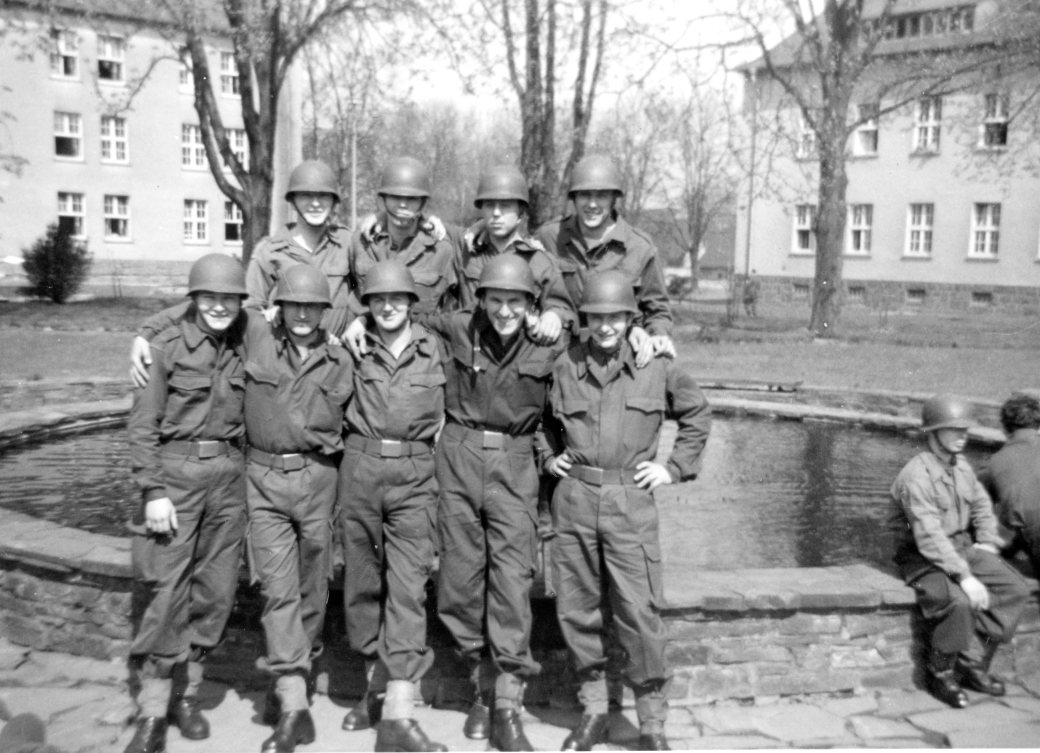
“Back in three minutes in your sports attire!” shouted the sergeant. Then we knew that this was going to be one of those ridiculous chicaneries that had no value except perhaps to test our willingness to obey without questioning orders no matter how senseless they appeared to be. The masquerade, as we would call it, lasted till one o’clock in the morning leaving us only a few hours of sleep. The very next morning we marched to a remote hill near the Moselle river where we ‘practiced’ the fine art of lying down and getting up and similar grotesque exercises. Like the rest of my comrades, I found them very tiring and annoying.
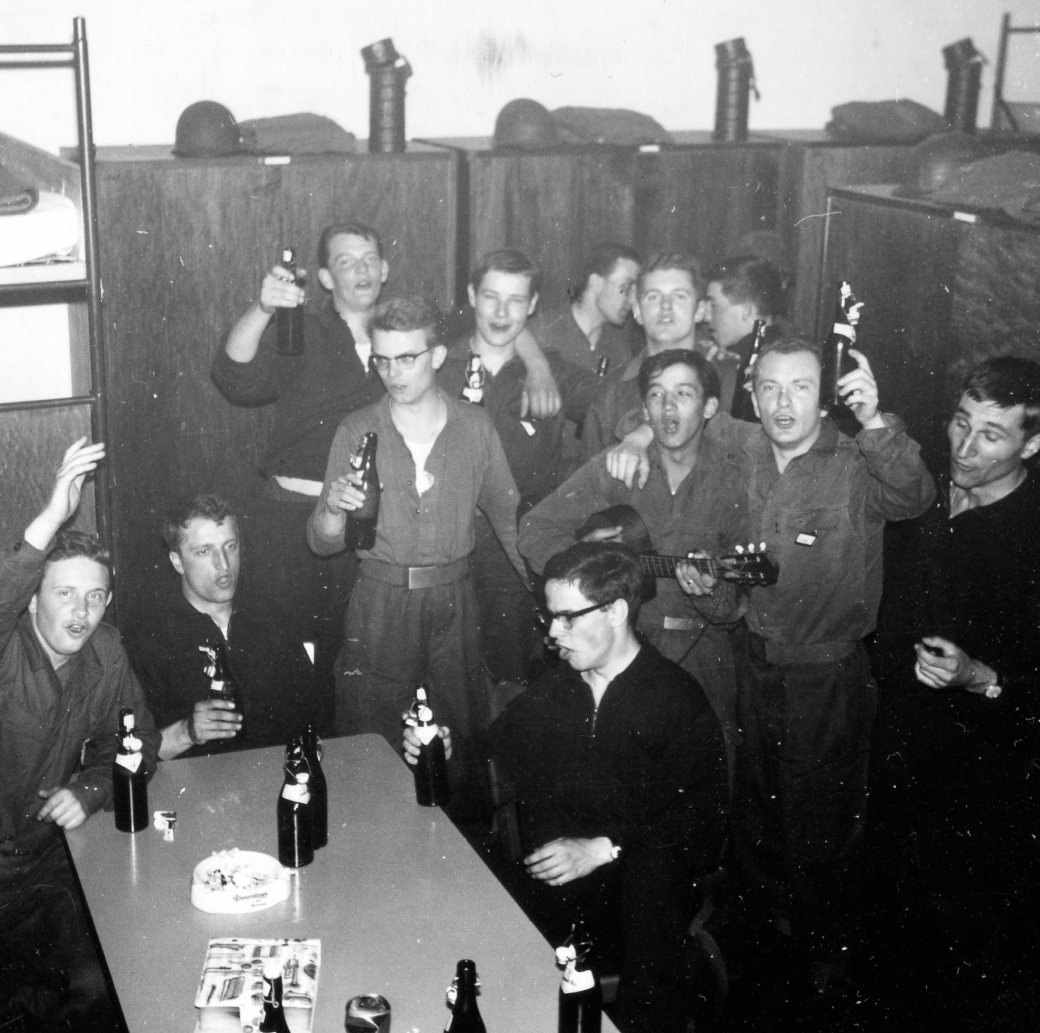
More enjoyable for me were the long marches. We had learned a large number of marching songs. They were peppy, they had rhythm and with their frequent reference to a soldier’s sweetheart tended to romanticize the otherwise unromantic world of army life. They lent to a marching column of soldiers the spirit that brought joy and strength to endure the drudgery of marching for endless miles in the heat and dust of the country roads. To make sure that the entire company would know which song to sing the soldier on the left in the front row would holler at maximum volume the title of the song, which would be repeated by the men behind him, until it had reached the very end of the marching column. The soldiers at the rear would then shout, “Song through!” That was the signal to all to start singing on the next step. The singing soothed the strain of the march, alleviated the fatigue, and let us forget the pain and discomfort of the heavy load on our back very much like the spirituals once providing relief to the black slaves working in the cotton fields of colonial America.
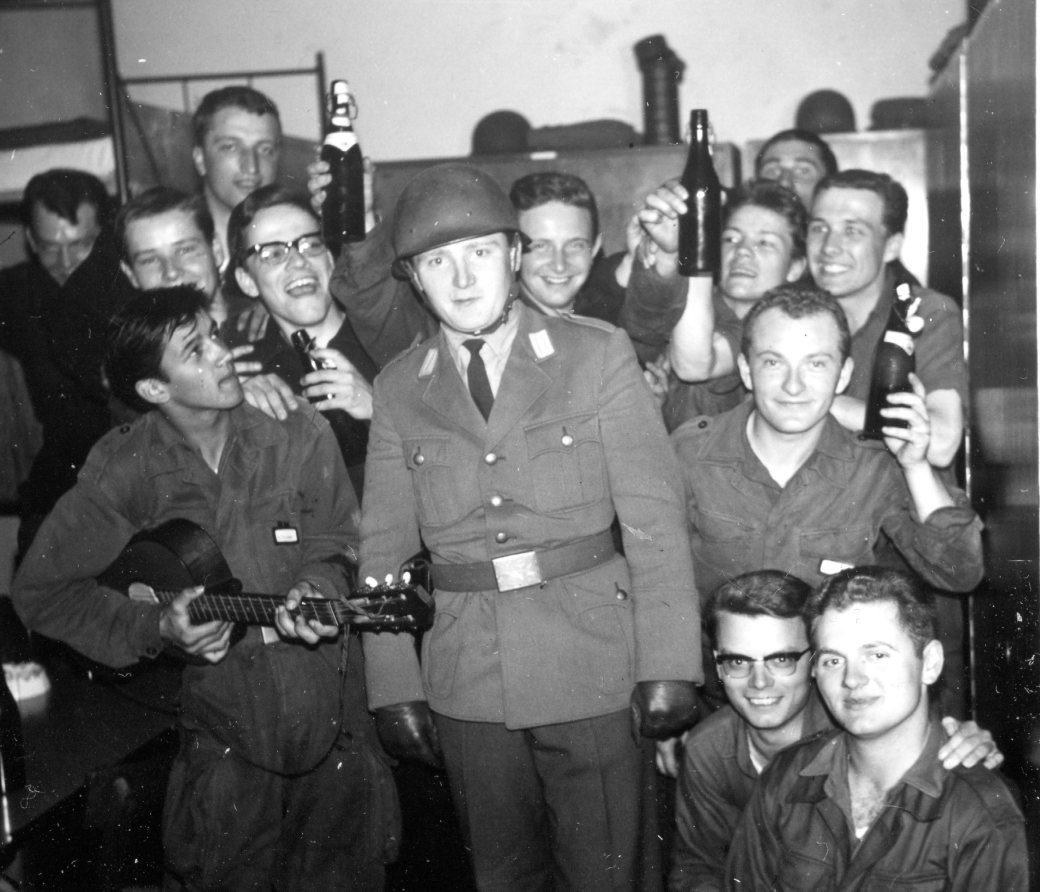
After such ordeals we frequently had a party in Room 203, seeking comfort in the merry companionship enhanced by drinking copious amounts of the cheap Koblenz brew available in the large half litre bottles. We sang our favourite army songs and shared the latest jokes not necessarily all clean. The corporal responsible for order on the second floor would occasionally join us and in my view was a freeloader with easy access to free beer. A roommate who had been barhopping returned just as we were cleaning up. He was so intoxicated that he could barely stand. The ten o’clock deadline was approaching, at which time we all had to be in bed except for the soldier on duty that week. The room had to be spick and span for the upcoming nightly inspection. Since the party had produced quite a mess, we all chipped in and helped to wipe the table clean, removed the empty bottles, and swept the floor. Meanwhile our drunken comrade barely managed to slip into his pajamas and then with great difficulty crawled into his bed, which fortunately was at the bottom of the bunk. The corporal who had participated in the drinking and carousing was grateful enough to overlook a multitude of infractions against the rules of cleanliness, such as the ashtray that someone had forgotten to empty. He had just closed the door to move on to Room 204, when a retching sound came from the corner, where our intoxicated friend had rolled out of his bed and fallen limply onto the wooden floor with a dull thud. He was unable to get up. The room was swirling around him. He made a desperate attempt to crawl on all fours to the door hoping perhaps that someone would be so kind to open it for him. He badly needed to go to the bathroom. But it was too late. He gagged in convulsive spasms. The stomach could no longer hold its disagreeable content and ejected it like in a violent volcanic eruption. Presently the stench of the vomit permeated the entire room. If we had not become somewhat accustomed to other unpleasant smells, of which beer farts were the worst kind, we too would have been sickened by this odoriferous environment. Horrified by sight, sound and smell we lay frozen in our beds and did nothing. How quickly could the boozer have received help, the floor cleaned up and the room aired, if we all had been ready to help? Then a miracle of tender love for one’s fellow human beings unfolded before our very eyes. The violinist – I later called him the Good Samaritan – climbed down from his bunk, opened his closet and took out some towels and a washcloth. From the bathroom down the hallway he brought a pail of water. Within the next few minutes he had the poor fellow all cleaned up, had helped him into a clean pair of pajamas and had gently heaved him back into his bed. Then he opened all the windows, wiped the smelly vomit with his own towels off the floor, went back to the bathroom to return the pail and wash up. Finally he came back and quietly climbed into his bed. From that night on, my friend, the violinist had gained my highest respect and admiration for the love that he had shown to one of his comrades of Room 203.
Biene’s Moroccan Pen Pal
One Saturday morning, not long before the short weekend leave, the corporal nervously entered our room and told us that the captain himself would be checking out hallway, room and closets. “Don’t disappoint me,” he demanded half pleadingly, half threateningly. We were eager to oblige being interested only in one thing, the pass that allowed us to go home. So we scrubbed and polished the wooden floor, mopped the tiles of the hallway especially well. For weeks I had specialized in cleaning the windows. I discovered that the toilet paper available in large quantities worked best to give the glass that desirable sparkling look. Of course, the closet had to be immaculate. Over one speck of dust a grumpy sergeant could deny your weekend pass or at the very least cause a delay of several hours.
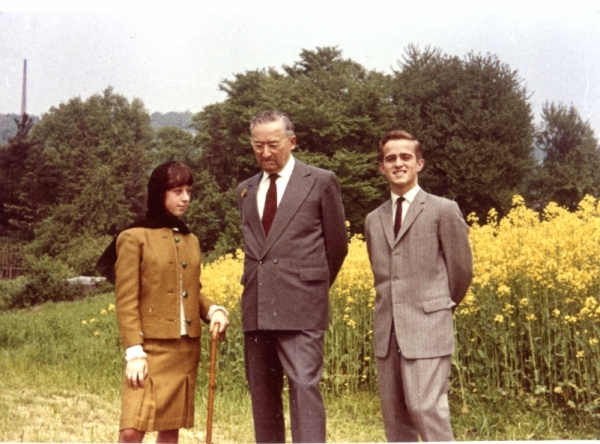
Biene, Papa Panknin, and Twin Brother Walter
The captain, however, not only represented the kind and benevolent father figure to us, but also had recently become the proud father of twins, the event that among us soldiers earned him the title Scatter Gun (Streubüchse). He now entered the room. We stood at attention next to our closet. It was clear from the way the captain approached the first soldier that he was more interested in passing on a few words of wisdom than in the inspection of our open closets. So when it was my turn, I was quite relaxed. He must have gone through our personnel files, for he said, “Klopp, I see that you are a high school graduate. What are your plans for the future?” Without waiting for an answer, he continued, “When you are young, you must have a dream. Without a dream you are nothing but a hollow entity. Understand me right; I am not talking about a fuzzy dream about getting rich and famous. What I mean is the dream of becoming a valuable member of society and a contributor to the common good.” With about these words the officer, turned philosopher, spoke to me. Now he reminded me that he had not answered his question.
“I love electronics and would like to become a high frequency engineer,” I stated emphatically.
As if ignoring my reply, the captain went back to the importance of having a dream. “A dream is nothing but an idle pipe dream, if you cannot find the means to realize it. You must have a plan backed up by a number of concrete steps. You must always keep your goal no matter how distant before you inner eyes, so you don’t miss your target.”
Then he came to the point, “So you want to become a high frequency engineer. That’s your dream. Well, here is a plan for you to consider. The Bundeswehr (German army) will send you to a postsecondary technical institute all expenses paid. In return, you commit yourself for ten years of service or if you wish, you can opt for a permanent career as officer and instructor. Think about it and let me know when you are ready to talk.” With these words he moved on to the next soldier, who had a picture of a naked woman taped to the inside of his closet door. The captain took one look and to our surprise did not reveal the slightest trace of anger, when he addressed him with a soft voice, “Say, young man, how would you feel to see a photo of your sister in the nude on somebody else’s closet door?” and with that remark he moved on to the next soldier. Needless to say we all got our weekend pass including the one with the pornographic picture. In a general assembly of the company our leader once spoke about his dream to read and understand Immanuel Kant’s ‘Critique of Pure Reason’ before his retirement. To be sure, it was a far loftier goal than mine of becoming an electronic engineer. The book that he was referring to is to the understanding of philosophy what Einstein’s theory of relativity is to the understanding of physics.

Falckenstein Barracks still in Use Today – Photo Credit: wikipedia .org
In the meantime Biene’s letters kept coming with the regularity of a clock and brought the sunshine of her empathy for the hardships of a soldier into my heart. We agreed to write one another in such a way as if we had known each other for a long time, to treat each other with honesty so that in the absence of face-to-face encounters no false impressions developed in our minds. Even secretiveness would be a form of dishonesty I noted in one of my letters. Being sincere was the necessary ingredient for the development of a true friendship leading so I was hoping to something more permanent. All Biene and I had for now were the letters, in which we expressed our feelings in the discussions of poetry, movies we had seen, or simply the daily obstacles that fate would throw into our path.
Up to this moment I had also maintained a loose correspondence with my dance partner Margret, who was working as a nurse’s aid in the Wesel hospital with the goal of becoming a registered nurse. The letters we wrote read more like newspaper reports and contained for the most part our criticism of the rotten world around us that we could not change. In short they were devoid of any feelings expressed or implied. In response to the dilemma that could only grow worse over time, I decided to write her a short note explaining to her in keeping with our sober writing style matter-of-factly as to why I did not wish to carry on with our correspondence. She acknowledged receipt of my message in a final postcard. I was relieved that she took my note with a sober mind and in the end did not get emotional about it.

Morocco’s Beautiful Coastal City – Photo Credit: wikipedia.com
In the meantime Biene was raving about the sunshine, warmth, beauty of a rocky coastline in a distant land in North Africa. I attributed the sudden and unexpected passion for Morocco to the extended periods of rain and depressing overcast skies we had experienced of late. But later she wrote about her grave concern for her pen pal. He had suddenly become ill and wanted her to come and visit him presumably in the hope for a miraculous recovery. The news came like a cold shower and considerably dampened my spirits. I realized that while I had read perhaps too much between the lines, Biene might have read too little. But who was I to assume that just because I had broken off the correspondence with Margret, Biene should do the same with her pen pals? So I did the right thing and expressed my sympathy with the fatally ill young man of Morocco. ‘Thousands of people’, I wrote, ‘die every day and it does not affect us. But if a friend or close relative passes away it is as if our world is falling apart. The bridges we so lovingly and carefully built to reach across suddenly collapse and only memories remain at the end.’
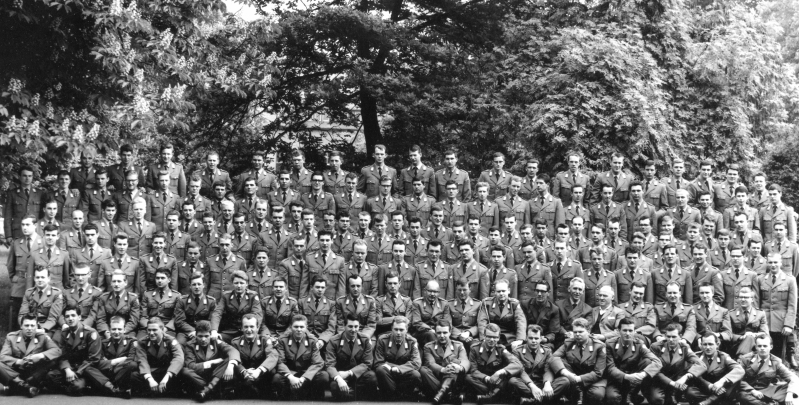
Final Photo of the entire Company – Who can find Peter?
In the meantime my basic training was coming to an end and I was getting ready for the transfer to the Falckenstein barracks. There was a lengthy pause in the flow of mail. Biene’s high school class went on a field trip to Paris, which was intended to be a short immersion into French culture. Upon her return she sent me a long letter describing her exciting adventure with her class in France, but did not mention her Moroccan friend any more. I carefully avoided the topic. Instead, knowing that Biene was taking Latin classes at high school I boldly sent her a signal in Latin: Amor qui non agitur moritur, which means ‘Love that is not active dies.’
Is it your story or a story of your own making..
LikeLiked by 1 person
Peter, it is enjoyable to learn the beginnings of your correspondence with Biene. The military training sounds better than I would have thought it was. The softer side of the Captain must have been a relief to all of the recruits.
LikeLiked by 2 people
In retrospect it was a good place, where I learned valuable life lessons.
LikeLiked by 1 person
Oh my. Peter !!! Don’t event know where to start. But for now – how many years did the German army required for young man to insist ? Curious about the minimum.
LikeLiked by 1 person
When drafted into the army, the soldiers had to serve for 18 months. I volunteered to serve 2 years, because a full salary was being paid. Now the German army recruits only volunteers. Thank you for your interest, Luda!
LikeLiked by 1 person
Very interesting, indeed. We had manditory 3.5 years in Soviet Russia with no pay…
LikeLiked by 1 person
It is so interesting to read this and realize that young men in the army, whether in Germany or the US, have similar experiences—the opportunity to become friends with people from diverse backgrounds, experiencing some of the ridiculousness of military rules and training, and the mix of both a form of freedom and a limitation on freedom.
When we were in Germany in 2017, we took a Rhine cruise from Bingen to Koblenz and spent several hours there. It’s a lovely city—I wish we’d had more time. We were heading to Cologne from there by train, where we then spent three days before traveling on to the Kassel region of Hesse.
LikeLike
I guess you went into the Kassel region to find more information on some of your ancestors coming from that area. The Rhine cruise must have been fascinating.
LikeLiked by 1 person
Yes, to both. The Rhine trip was so peaceful and relaxing. We had spent several days in the area—went to Mainz, Bingen, and my ancestral hometown of Gau-Algesheim. And yes, the Kassel region is where all of my father’s maternal ancestors once lived—Sielen, Breuna, Jesberg, Oberlistingen.
LikeLiked by 1 person
I wonder, if Biene wanted to test you with mentioning the illness of her pen pal? 😉 See your reaction …
I can imagine that her letters were the highlights of dour military life. But you seem to have been fortunate with your “room mates”.
LikeLike
Her letters were coming in at least twice a week, which brightened up my day.
As to being test, you will see later, at that particular time I was one of the many flowers that my little bee (Biene) was visiting. You will find out soon when the next chapters are being published. Have a great day, Brigit!
LikeLiked by 1 person
Olala … 😉 … You too have a great day!
LikeLiked by 1 person
Peter, you are just an amazing writer, I am flying through your lines with much interest and enjoyment. The bounding between you and Biene had than been already very strong. Thank you so much for writing.
LikeLiked by 1 person
Thank you, Cornelia! Your insightful comments are much appreciated. Have a great day!
LikeLiked by 1 person
Your write about the past events of your life with such clarity and details. It is an interesting read. In comparison, what I have to come to know in current times is that you have a very high chance of running into a bully rather than helpful partners. well, I guess that was a different time!
LikeLiked by 1 person
Thank you for posting the German Corner (Deutsches Eck) Koblenz 🙂
You know why!
Guess you are the fourth one from right sitting.
LikeLiked by 1 person
Wie schon einmal erwähnt,Peter, kenne ich viele Deiner Erinnerungen .Ich schreib es trotzdem nochmal:Es fesseln mich immer wieder Dein fester Wille und Dein Durchhaltevermögen in der beschriebenen Zeit! Du hast wohl schon immer eben diesen eisernen Willen gehabt, Deine gesteckten Ziele zu erreichen!👍 Alle Achtung!!
Wie schön Du auch gerade Deine ersten Erinnerungen an Biene zum Ausdruck bringst..Sie war und ist wirklich etwas Besonderes!
Herzliche Grüsse aus Sottmar!!!👋👋👋
LikeLiked by 1 person
Liebe Edda, ich bin ganz gerührt, dass du unsere Geschichte noch einmal liest, jetzt, wo sie in ganzen Kapiteln erscheint und so viel mehr Lesen verlangt. Ganz herzlichen Dank! Ich schicke bald eine Email mit den allerletzten Nachrichten aus Kelowna.
LikeLike
Die Zeit in der Armee scheint bei Dir einen sehr großen Eindruck hinterlassen zu haben, lieber Peter. Aber jeder lernt die Lektionen des Lebens woanders. Bin nur von Wehrdienstverweigerern umgeben, sorry. Wünsche Dir noch einen schönen Tag in Canada, liebe Grüße Mitza
LikeLiked by 1 person
Oh, ich dachte, es gibt keine Wehrpflicht mehr in Deutschland. Viele liebe Grüße von Peter und Biene!
LikeLiked by 1 person
Wir stammen ja noch aus einer Zeit, wo es sie gab:)
LikeLiked by 1 person
Peter, I love reading about your life, in all of it’s rich detail. Thanks for sharing with us. And, I must say, you looked rather smart in your uniform!
LikeLiked by 1 person
Thank you so much for your compliment! It means a lot to me. Best wishes and kind greetings! Peter
LikeLike
I love this insight into your life as a new recruit, and the earlier story of you and Biene! It does sound as if basic training in Germany is very similar to the United States. Your story is so interesting and compelling…thanks for sharing it!
LikeLiked by 1 person
The more I read your comments and of others , the more I realize I find the most resonance with people who through age and experience can relate to our story. Thank you, Ann, for your kind words!
LikeLiked by 1 person
Peter, nice to read about your military experience. It adds a whole new dimension to your story. I can only imagine how uplifting it was to receive Biene’s letters during this time. It seems to me you took everything in stride and made the most of it.
LikeLiked by 1 person
Thank you, Des! It was indeed a pleasure to receive Biene’s comforting letters during the 3 rough months of basic training in the army.
I would like to take this opportunity to express my gratitude for dedicating to our story an entire post on your very own blog. I must say I was overwhelmed by the insightful letter you published last week. Also your interest in the forced mass migration of the people of Germany’s eastern provinces Pomerania, East Prussia and Silesia has deeply touched me. The events of those days are widely unknown in a world where political correctness is the main cause for this type of ignorance.
Thank you again and have a great day, Des!
LikeLiked by 1 person
I thoroughly enjoyed writing about your blog, and a couple of people commented who also follow you. You truly are a gifted thinker and writer.
As for the political correctness aspect, it never occurred to me as I read it, but I get it now. I’m glad you allowed me to give my thoughts on such an interesting (and educational) chapter of your life. Thanks much, Peter! You have a great day too.
LikeLiked by 1 person
I’m very impressed by the violist’s compassion for his fellow soldier. Cleaning up like that must have been a thoroughly unpleasant experience. I wonder whether in the same situation I would have acted so kindly.
Incidentally, I was surprised and rather amused by the fact that the soldiers considered not putting a padlock on a locker door to be a blameworthy act since it unfairly tempted one’s fellows. Rest assured, I’ve taken the message to heart and have locked my doughnut safely in the top drawer of my desk where my children can’t find it.
LikeLike
That was an army rule with the perception that an unlocked door to your personal belongings is an open invitation to theft. So you were deemed to be co-responsible for the crime.
The good Samaritan in our room will be forever a guiding light for my own actions when dealing with people in need.
Thank you, Bun, for this wonderful comment!
LikeLiked by 1 person